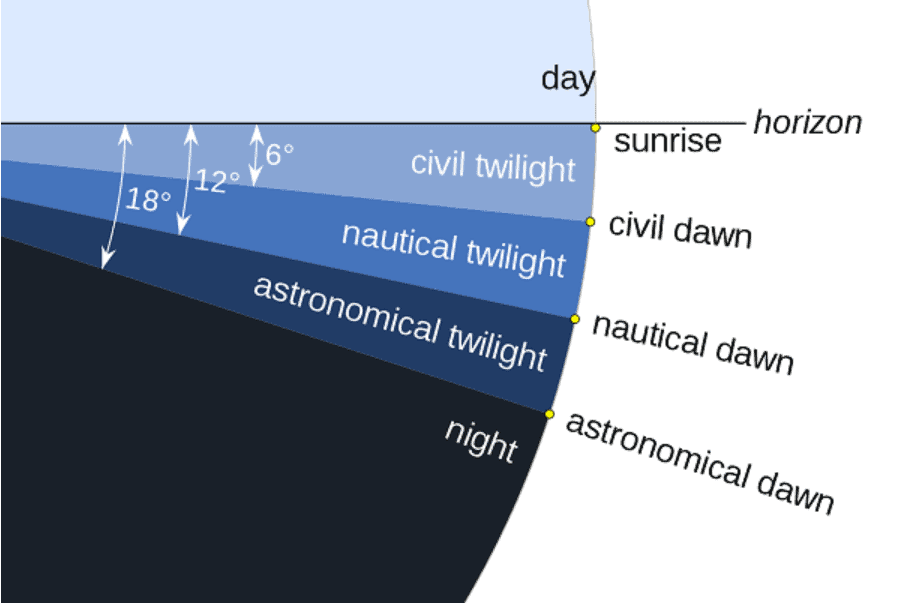It typically gets dark 30 to 60 minutes after sunset. The exact time depends on your location and time of year.
The transition from sunset to complete darkness, known as twilight, varies. In general, it takes about 30 to 60 minutes for the sky to become fully dark after the sun sets. This duration depends on your geographical location and the time of year.
Closer to the equator, twilight is shorter, while at higher latitudes, it can last longer. During summer, the sun takes a longer path below the horizon, extending twilight. Conversely, in winter, darkness falls more quickly. Understanding these variations can help plan evening activities and photography sessions.
Twilight Phases
Understanding the twilight phases can help you know how long after sunset it gets dark. These phases are essential for astronomers, sailors, and even photographers. Let’s explore the three main twilight phases: Civil Twilight, Nautical Twilight, and Astronomical Twilight.
Civil Twilight
During Civil Twilight, the sun is just below the horizon. This phase begins right after sunset. It lasts until the sun is 6 degrees below the horizon. During this time, there is still enough light for most activities. Streetlights often turn on during this phase. You can still see the outlines of objects clearly.
Nautical Twilight
Nautical Twilight occurs when the sun is between 6 and 12 degrees below the horizon. This phase is crucial for sailors. It helps them navigate using the stars and the horizon. The sky starts to get darker. The horizon becomes less visible. It is harder to distinguish objects on the ground.
Astronomical Twilight
Astronomical Twilight happens when the sun is 12 to 18 degrees below the horizon. During this phase, the sky is dark enough for astronomers. They can observe celestial objects without interference from sunlight. The sky appears almost completely dark. Stars and planets become visible. This phase marks the end of twilight and the beginning of night.
Factors Affecting Darkness
How long it takes to get dark after sunset depends on several factors. Knowing these factors can help you plan your evening activities better.
Geographical Location
Your location on Earth greatly impacts how quickly it gets dark. Near the equator, darkness falls quickly after sunset. In contrast, at higher latitudes, twilight lasts longer.
For example, in tropical areas, the transition from light to dark is swift. But in places like Norway, it can take hours for complete darkness.
Time Of Year
The time of year also affects how fast it gets dark. During summer, days are longer, and nights are shorter. In winter, the opposite is true.
During summer solstice, twilight can extend for hours. During winter solstice, darkness falls quickly after sunset.
Weather Conditions
Weather plays a role in how quickly it gets dark. Overcast skies can make it appear darker sooner after sunset. Clear skies allow for a longer twilight period.
Rain, fog, or snow can also reduce visibility and make it seem darker. Clear weather allows more light to linger, delaying complete darkness.
Scientific Explanation
Understanding how long it takes to get dark after sunset involves science. Two main factors are at play: Earth’s Rotation and Atmospheric Refraction. Let’s dive into these concepts.
Earth’s Rotation
The Earth rotates around its axis, causing day and night. This rotation makes the sun appear to move across the sky. As the sun sets, it dips below the horizon, leading to darkness.
The speed of Earth’s rotation affects how quickly darkness falls. Near the equator, the transition is faster. Farther from the equator, the change is slower.
| Location | Time to Get Dark |
|---|---|
| Equator | 20-30 minutes |
| Mid-Latitudes | 30-60 minutes |
| Poles | Over an hour |
Atmospheric Refraction
Atmospheric refraction bends light as it passes through Earth’s atmosphere. This bending causes the sun to appear above the horizon even after it has set.
Light travels through different layers of the atmosphere, bending more as it nears the horizon. The thicker the atmosphere, the more bending occurs.
- Clear skies lead to less refraction.
- Thick clouds or pollution cause more refraction.
The combination of Earth’s rotation and atmospheric refraction determines how long it takes to get dark after sunset. Both factors are essential to this natural phenomenon.
Credit: www.opticalmechanics.com
Cultural Significance
The time after sunset holds immense cultural significance across the globe. Different cultures have unique traditions linked to this period. This intriguing phase of twilight often finds its way into various rituals, folklore, and daily activities. Let’s explore the cultural importance of this magical time.
Traditions And Folklore
Many cultures have age-old traditions and folklore tied to the time after sunset. These stories and customs often reflect the community’s beliefs and values.
- In rural areas, people light lanterns to ward off spirits.
- Some cultures tell stories about mythical creatures emerging after sunset.
- Families gather for evening prayers or rituals as darkness falls.
These traditions add a sense of wonder and magic to the time after sunset. They also help in passing down cultural heritage from one generation to the next.
Different Cultures
Various cultures experience sunset and darkness in unique ways. Let’s look at some examples:
| Culture | Tradition |
|---|---|
| Japanese | Enjoying tea ceremonies during twilight. |
| Indian | Lighting oil lamps and performing evening prayers. |
| Mexican | Engaging in evening festivals and dances. |
Each culture celebrates the time after sunset in its own distinctive way. These practices enrich the cultural tapestry of our world.
Practical Applications
Understanding how long after sunset it gets dark has many practical uses. Knowing this can help in planning outdoor activities and astronomy observations. This knowledge ensures you make the most of your time outdoors or under the stars.
Outdoor Activities
Many outdoor activities depend on the amount of daylight. Knowing when it gets dark can help you plan better. For example, hikers need to know when to start heading back. Campers need to set up tents before it gets too dark.
Here’s a table to help with planning:
| Activity | Ideal Time |
|---|---|
| Hiking | 2 hours before sunset |
| Camping | 1 hour before sunset |
| Fishing | 30 minutes after sunset |
Astronomy Observations
Astronomy enthusiasts need complete darkness for the best observations. Knowing how long after sunset it gets dark helps in planning. You can set up your telescope in time and catch all celestial events.
Steps to prepare for astronomy observations:
- Check the sunset time.
- Wait for 30-60 minutes after sunset.
- Set up your telescope in a dark area.
- Start observing the night sky.
Remember, light pollution can affect your observations. Choose a location far from city lights.
Credit: www.quora.com

Credit: nineplanets.org
Frequently Asked Questions
How Long After Sunset Does It Get Dark?
It typically gets dark around 30 to 60 minutes after sunset. The exact time can vary based on your location and the time of year.
Does The Time It Gets Dark Vary?
Yes, the time it gets dark varies by location and season. Factors like latitude and atmospheric conditions can also affect this time.
Why Does It Take Time To Get Dark After Sunset?
It takes time to get dark due to the Earth’s atmosphere scattering sunlight. The scattering process causes twilight, which delays darkness.
What Is Civil Twilight?
Civil twilight is the period after sunset when there is still enough light. During this time, outdoor activities without additional lighting are possible.
Conclusion
Understanding how long after sunset it gets dark depends on various factors. Location, season, and weather all play a role. Typically, it takes about 30 to 90 minutes for complete darkness. Knowing this can help you plan evening activities better.
Stay informed and enjoy your nights under the stars.
